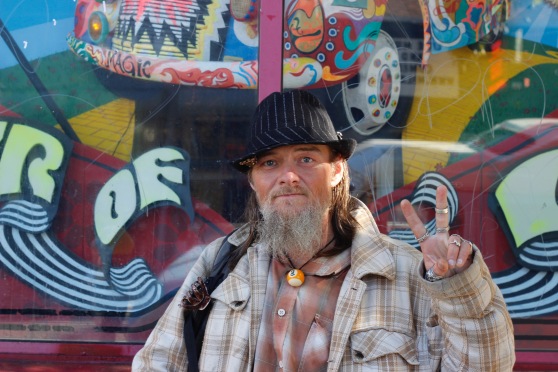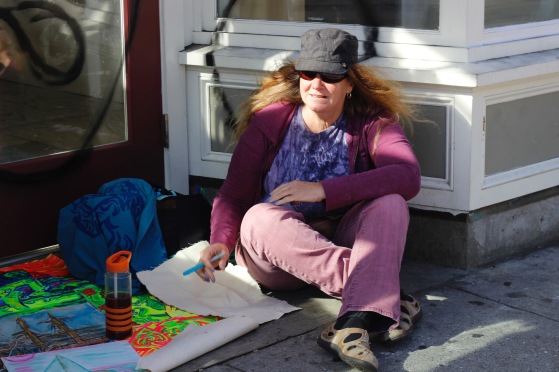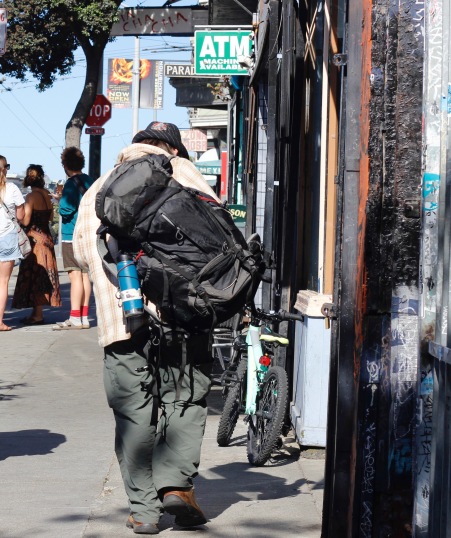Bay News Rising
Professional and college reporters training collaboratively for the future of Bay Area journalism. Bay News Rising is a project of the Pacific Media Workers Guild made possible by the labor and contributions of its members.
After nearly six years, the sit-lie law is having trouble staying on its feet
By Grady Penna, Bay News Rising staff reporter –
Decorated with a nine-ball ornament dangling from his neck, rings covering each finger and a hulking pack strapped to his back, Patrick Bral spends most days on his feet.
As a homeless man, Bral faces the challenge of locating a safe place to rest after his daily treks — a task that became even more daunting after voters passed the so-called “sit-lie” ordinance nearly six years ago, a law that makes sitting or resting on public sidewalks an illegal act.
“It’s hard to walk around with something on your back all the way up and down the street without taking a break every once in a while,” said Bral, who didn’t give his age, but looks to be about 40. “We would sit down by the McDonald’s after walking all day with our packs and the cops would come and harass us, search us and give us tickets.”
Bral is one of the several dozen or so street people who still sprawl on corners and in doorways in the Upper Haight. Although there are fewer street people in the neighborhood than when the law was passed, the controversy over sit-lie remains heated.

Patrick Bral, a homeless man who frequents the Upper Haight, poses for a photo in front of Amoeba Music on Haight Street on Saturday, June 25, 2016. (Photo by Grady Penna / Bay News Rising)
A recent report commissioned by Supervisor Eric Mar found that so-called quality of life laws like sit-lie are expensive, largely ineffective, and have made large numbers of homeless people miserable in the process.
Nonetheless, public anger at the homeless is growing, and the passage of regulations that activists see as punitive appear more likely than a repeal of sit-lie. Supervisor Mark Farrell, for example, has introduced an initiative on the November ballot that would ban homeless camps in San Francisco.
Does sit-lie help or hurt?
Though some community organizers in homeless hotspots like the Haight believe the sit-law law has helped the neighborhood, some police officers and members of the San Francisco Board of Supervisors are not convinced sit-lie is doing any good.
“There are so many people who are on the street with nowhere else to go that (the police) are essentially just shuffling people along,” said John Avalos, supervisor for District 11. “To use precious police resources to merely shuffle people along is asinine.”
According to Avalos, sit-lie was pitched to voters in the 2010 election as a means to appease their anger over the homeless population, rather than introducing an actual solution. “It was a measure to scapegoat and demonize homeless youth, and it was very effective in doing that,” Avalos said in a telephone interview.

Local painter Cynthia Jones lays out her artwork on the sidewalk to sell to passers-by on Haight Street on Saturday, June 25, 2016. (Photo by Grady Penna / Bay News Rising)
Some police officers charged with enforcing the law now say that sit-lie is only a temporary solution at best, and a more extensive approach is needed in order to address homelessness as a whole.
“I think we need to focus more on providing treatment and shelter programs for the homeless in order to make (sit-lie) effective,” said Carlos Manfredi, a spokesman for the San Francisco Police Department. “It’s not very effective if I just tell somebody to move, because all I’m doing is moving the problem to another location.”
Manfredi says police understand that being homeless is difficult. They often try to reach out and explain the services San Francisco offers before writing a ticket. But even in those cases, it does little to alleviate the problem, he says.
“I think it’s a collaborative effort, everyone has a share in dealing with this problem,” said Manfredi. “The Department of Public Health has to help out, the hospitals need to help out, all the outreach programs need to help and of course police officers need to as well.”
However, others argue that while sit-lie isn’t a perfect solution, it’s still had a positive effect on the Haight, where it is frequently enforced.
“We’ve seen a decrease in transients operating on the sidewalk (in the Haight) and so I think that’s helped the community,” said Ted Loewenberg, the president of the Haight Ashbury Improvement Association.
The ordinance was supposed to give police the power to stop people from sprawling on the sidewalk without waiting for a complaint, he said. “The allegations are that this is an anti-homeless measure, but it has nothing to with homelessness; it has to do with preventing people from conducting themselves on the sidewalk in ways that are simply not civil.”
Sit-lie here to stay
Like it or not, says Avalos, sit-lie will probably not be repealed in the near future.
“I don’t see that happening this November, and there are no other elections in San Francisco for a couple years,” said Avalos.
The proposed November measure would allow authorities to dismantle homeless encampments with a 24-hour notice. The initiative and the likely continuation of sit-lie makes Bral nervous.
“I bet nobody who lives in a house has gotten a ticket because of this law,” said Bral. “The cops will just come along nicely and tell them to move.”
“I tend to keep moving because of that law,” he said. “I’ve had some bad incidences with the cops where I have been beat up, so when I see them coming I get up and move.”

Patrick Bral continues his walk down Haight Street with most of his belongings strapped to his back on Saturday, June 25, 2016.


Well balanced report
This is a complicated problem, thank you for the information and update.
No one should be homeless in this country. The claim of “lack of funds” is false, No one has ever seen a war that we didn’t have billions to throw into for corporate gains. Just today we invaded Libya, and media failed to mention this cost, or the war. No one mentioned the Drones multiplying in Africa that taxpayers will pay for, but nothing for public education is coming? Priorities?